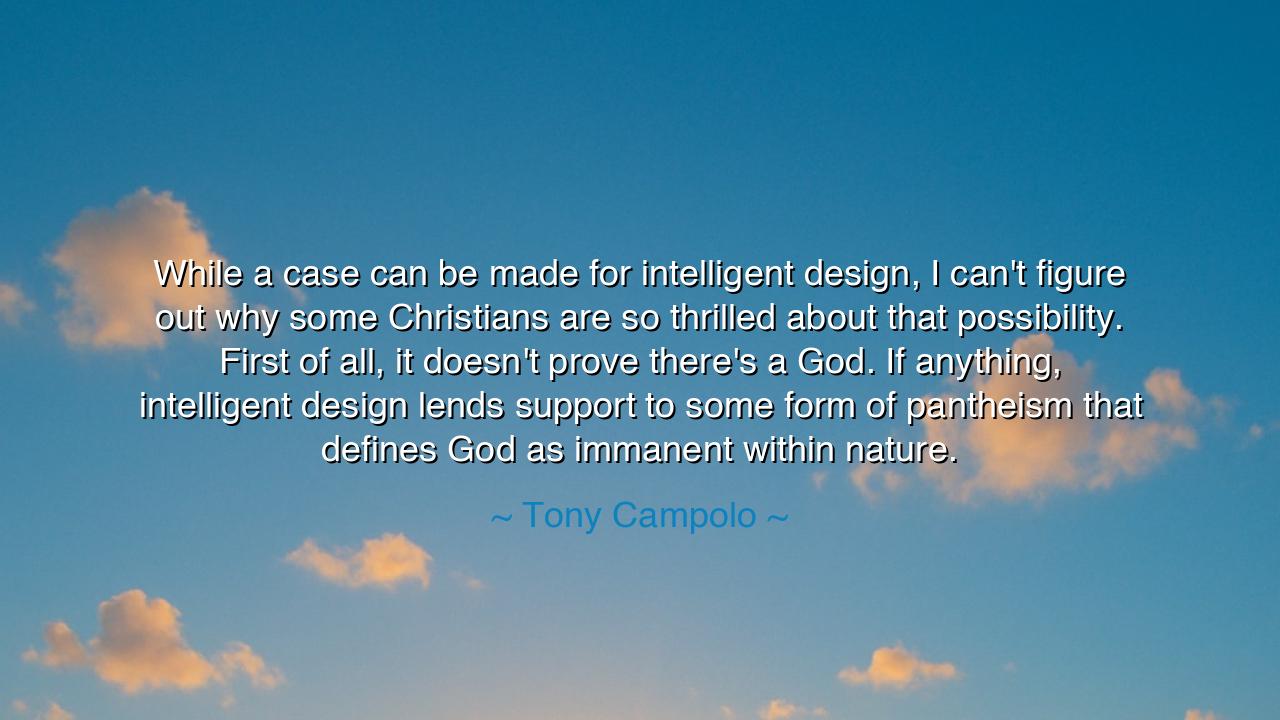
While a case can be made for intelligent design, I can't figure
While a case can be made for intelligent design, I can't figure out why some Christians are so thrilled about that possibility. First of all, it doesn't prove there's a God. If anything, intelligent design lends support to some form of pantheism that defines God as immanent within nature.






“While a case can be made for intelligent design, I can’t figure out why some Christians are so thrilled about that possibility. First of all, it doesn’t prove there’s a God. If anything, intelligent design lends support to some form of pantheism that defines God as immanent within nature.” — Tony Campolo
Thus spoke Tony Campolo, the preacher and scholar, whose voice has long sought to unite faith and reason, spirit and intellect, in a world too quick to divide them. His words are not an attack upon belief, but a warning to the faithful — a call to humility in the face of mystery. In this reflection, Campolo reminds us that truth cannot be captured by human cleverness, and that even the most dazzling theory of creation may fall short of the divine reality it seeks to explain. For what is intelligent design, if not the attempt of mortals to discern the marks of a greater mind upon the canvas of creation? Yet, Campolo urges caution: to find design is not to find God Himself, but only to glimpse the shadows of His handiwork.
When Campolo says he “can’t figure out why some Christians are so thrilled” by intelligent design, he is speaking to a deeper spiritual tension — the desire for proof. Many believers, weary of the mockery of skeptics, look to science for validation of their faith, hoping that a divine architect revealed in biology or physics might settle the matter once and for all. But Campolo reminds them that faith born of evidence alone is fragile, for when the evidence shifts, so too does belief. True faith, he implies, does not rest upon equations or arguments, but upon relationship — the living encounter between the soul and the Divine.
And yet, Campolo goes further. He warns that intelligent design, if not rightly understood, may not point to the God of transcendence, who reigns above creation, but rather to the God of immanence, who dwells within it — a vision closer to pantheism than to Christianity. In pantheism, the universe itself is divine, and God is not separate from matter but identical with it. Campolo’s concern is that in seeking to find proof of God in the structure of atoms or the pattern of DNA, we risk worshiping creation instead of the Creator. For the one who made the stars is not the stars themselves; the potter is not the clay, though his fingerprints lie upon every curve.
Consider the story of Sir Isaac Newton, a man of both science and faith. In his search for the laws of the universe, Newton saw the hand of a rational Creator, a divine intelligence ordering the cosmos. Yet, as the centuries passed, his discoveries were used by others to argue the opposite — that the universe could run without God, that mechanism replaced mystery. This is the peril Campolo speaks of: that what begins as reverence may end as reduction, that in proving the design, we may forget the Designer. The sacred must not be confined to the boundaries of human logic, for the Infinite cannot be measured by finite minds.
In truth, Campolo’s insight leads us back to awe, that ancient posture of wonder before the unknown. The purpose of creation, he implies, is not to serve as evidence in a debate, but as an invitation to worship. To see design is to marvel; to feel design is to be moved; but to know God is to be transformed. The rivers, the stars, the beating heart — these are not arguments, but sacraments. They are windows through which we glimpse the light beyond all comprehension.
Therefore, my children, take this teaching to heart: seek understanding, but never mistake knowledge for faith. Let science reveal the beauty of creation, but let your soul bow before the mystery that lies beyond it. Do not cling to theories as idols of certainty; instead, dwell in the living presence of God — transcendent above you, immanent within you, yet always greater than all you can name or know.
For as Campolo teaches, the grandeur of the universe is not proof of God — it is the poetry of God, sung into being by love. The wise do not chase the Divine through formulas or fossils; they find Him in the pulse of compassion, in the stillness of prayer, in the courage to believe without seeing. And so, let the stars remind you not of a puzzle to solve, but of a Presence to adore. For the true proof of God is not in the design of the world, but in the transformation of the heart that beholds it with wonder and humility.






AAdministratorAdministrator
Welcome, honored guests. Please leave a comment, we will respond soon